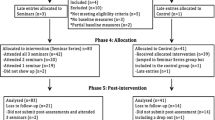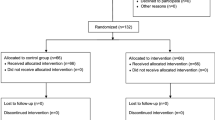Abstract
Triple P is a parenting program that aims to prevent behavioral, emotional, and developmental problems in children. Because Triple P is a new parenting program in Sweden, it is important to see how parents felt about the intervention. The aim of this study was to find out why parents of preschool children chose to participate in Triple P in Sweden, what they thought of the Triple P curriculum, and how the program related to their parenting philosophy in general. This is a qualitative study using semi-structured interviews with seven mothers and three fathers who participated in Triple P. The interviews were transcribed verbatim and were analysed using Malterud’s method of Systematic Text Condensation. Parents chose to participate in Triple P for several reasons: they wanted to learn more about the intervention; they had specific problems that they sought help for; or they felt encouraged to participate due to advertisements and recommendations from friends. Of the Triple P curriculum, the participants especially enjoyed the “directed discussion” technique, the positive reinforcement sections, and the instructions on how to communicate effectively with their child by staying calm, close, and maintaining eye contact. It was important for many of the parents to feel validated and respected, and they liked having discussions with the preschool teacher rather than being told what to do. Parents in this Swedish sample generally liked and selectively used the strategies they learned from participating in Triple P, depending on how well these fit with their own parenting experiences and philosophy.
Similar content being viewed by others
References
Bor, William, Sanders, Matthew R., & Markie-Dadds, Carol. (2002). The effects of the Triple P-positive parenting program on preschool children with co-occurring disruptive behavior and attentional/hyperactive difficulties. Journal of Abnormal Child Psychology, 30(6), 571–587.
Börjesson, Britt, Paperin, Christina, & Lindell, Marianne. (2004). Maternal support during the first year of infancy. Journal of Advanced Nursing, 45(6), 588–594.
Bremberg, S. (2004). Nya verktyg för föräldrar: förslag till nya former av föräldrastöd (New tools for parents: Proposals for new forms of parenting) (Vol. 49). Sweden: Statens folkhälsoinstitut Stockholm.
Buehler, C., & Gerard, J. M. (2002). Marital conflict, ineffective parenting, and children’s and adolescents’ maladjustment. Journal of Marriage and Family, 64, 78–92.
Cina, A., Blattner-Bolliger, D., Bodenmann, G., Hahlweg, K., & Sanders, M. R. (2006). Positive Parenting Program (Triple P): Theoretischer und empirischer Hintergrund und erste Erfahrungen im deutschsprachigen Raum. [Positive Parenting Program (Triple P): Its theoretical and empirical background and first experiences with this approach in German speaking Europe]. Zeitschrift für Familienforschung (Journal of Family Research), 18(1), 66–88.
de Graaf, I., Speetjens, P., Smit, F., de Wolff, M., & Tavecchio, L. (2008). Effectiveness of the Triple P Positive Parenting Program on behavioral problems in children: A meta-analysis. Behavior Modification, 32(5), 714–735.
Duvander, Ann-Zofie. (2008). Family policy in Sweden: An overview. Social Insurance Report, 15, 1–18.
Fägerskiöld, A. M., & Ek, A.-C. (2003). Expectations of the Child Health Nurse in Sweden: Two perspectives. International Nursing Review, 50, 119–128.
Fägerskiöld, A. M., Wahlberg, V., & Ek, A.-C. (2000). What child health nurses believe mothers with infants expect of them. Nursing and Health Sciences, 2, 83–91.
Furlong, M., McGilloway, S., Bywater, T., Hutchings, J., Smith, S.M., & Donnelly, M. (2012). Behavioural and cognitive‐behavioural group‐based parenting programmes for early‐onset conduct problems in children aged 3–12 years. Cochrane Database of Systematic Reviews(2). doi: 10.1002/14651858.CD008225.pub2.
Gallart, Sonia C., & Matthey, Stephen. (2005). The effectiveness of group Triple P and the impact of the four telephone contacts. Behaviour Change, 22(2), 71–80.
Guldbrandsson, K., & Bremberg, S. (2006). Two approaches to school health promotion–a focus on health-related behaviours and general competencies. An ecological study of 25 Swedish municipalities. Health Promotion International, 21(1), 37–44.
Gustafsson, L.H. (2009). Förskolor använder sektmetod. Retrieved Sept 15 2012, from http://www.unt.se/inc/print/foumlrskolor-anvaumlnder-sektmetod-257679-default.aspx.
Hannon, P., Morgan, Anne, & Nutbrown, C. (2006). Parents’ experiences of a family literacy programme. Journal of Early Childhood Research, 4, 19–44.
Kaminski, W., Jennifer, V., Anne, L., Filene, J. H., & Boyle, C. L. (2008). A meta-analytic review of components associated with parent training program effectiveness. Journal of Abnormal Child Psychology, 36(4), 567–589.
Krishnakumar, A., & Buehler, C. (2000). Interparental conflict and parenting behaviors: A meta-analytic review. Family Relations, 49, 25–44.
Leung, C., Sanders, M. R., Leung, S., Mak, R., & Lau, J. (2003). An Outcome evaluation of the implementation of the Triple P-Positive Parenting Program in Hong Kong. Family Process, 42(4), 531–544.
Malterud, K. (2012). Systematic text condensation: A strategy for qualitative analysis. Scandinavian Journal of Public Health, 40(8), 795–805.
Malti, T., Ribeaud, D., & Eisner, M. P. (2011). The effectiveness of two universal preventive interventions in reducing children’s externalizing behavior: A cluster randomized controlled trial. Journal of Clinical Child and Adolescent Psychology, 40(5), 677–692.
Marmot, M., Atkinson, T., Bell, J., Black, C., Broadfoot, P., Cumberlege, J., Mulgan, G. (2010). Fair society, healthy lives: The marmot review, executive summary. From http://www.marmotreview.org/AssetLibrary/pdfs/Reports/FairSocietyHealthyLives.pdf.
Morawska, A., & Sanders, M. R. (2006). A review of parental engagement in parenting interventions and strategies to promote it. Journal of Children’s Services, 1(1), 29–40.
Morawska, A., Sanders, M. R., Goadby, E., Headley, C., Hodge, L., McAuliffe, C., et al. (2011). Is the Triple P-Positive Parenting Program acceptable to parents from culturally diverse backgrounds? Journal of Child and Family Studies, 20(5), 614–622.
Nowak, C., & Heinrichs, N. (2008). A comprehensive meta-analysis of Triple P-Positive Parenting Program using hierarchical linear modeling: Effectiveness and moderating variables. Clinical Child and Family Psychology Review, 11(3), 114–144.
Patterson, G. R., Chamberlain, P., & Reid, J. B. (1982). A Comparative evaluation of a Parent-Training Program. Behavior Therapy, 13, 638–650.
Prinz, R. J., Sanders, M. R., Shapiro, C. J., Whitaker, D. J., & Lutzker, J. R. (2009). Population-based prevention of child maltreatment: The US Triple P system population trial. Prevention Science, 10(1), 1–12.
Sandelowski, M. (1986). The problem of rigor in qualitative research. Advances in Nursing Science.
Sanders, M. R. (1999). Triple P-Positive Parenting Program: Towards an empirically validated multilevel parenting and family support strategy for the prevention of behavior and emotional problems in children. Clinical Child and Family Psychology Review, 2(2), 71–90.
Sanders, M. R. (2000). Community-based parenting and family support interventions and the prevention of drug abuse. Addictive Behaviors, 25(6), 929–942.
Sanders, M. R. (2008). Triple P-Positive Parenting Program as a public health approach to strengthening parenting. Journal of Family Psychology, 22(4), 506.
Sanders, M. R., Markie-Dadds, C., Tully, L. A., & Bor, W. (2000). The triple P-positive parenting program: a comparison of enhanced, standard, and self-directed behavioral family intervention for parents of children with early onset conduct problems. Journal of Consulting and Clinical Psychology, 68(4), 624.
Sanders, M. R., Markie-Dadds, C., & Turner, K. M. T. (2003). Theoretical, scientific and clinical foundations of the Triple P-Positive Parenting Program: A population approach to the promotion of parenting competence (Vol. 1). Queensland: Parenting and Family Support Centre, The University of Queensland.
Sarkadi, Anna (red). (2009). Föräldrastöd i Sverige idag: vad, när och hur?: rapport till Statens Folkhälsoinstitut (Parent in Sweden today : what, when and how ?: Report to the National Institute of Public Health). Institutionen för kvinnors och barns hälsa (Institute for Women’s and Children’s Health).
Spoth, R., & Redmond, C. (1995). Parent motivation to enroll in parenting skills programs: A model of family Context and health belief predictors. Journal of Family Psychology, 9(3), 294–310.
Stenhammar, C., Wells, M., Åhman, A., Wettergren, B., Edlund, B., & Sarkadi, A. (2012). Children are exposed to temptation all the time’–parents’ lifestyle-related discussions in focus groups. Acta Paediatrica, 101(2), 208–215.
Swedish Council on Health Technology Assessment. (2010). Program för att förebygga psykisk ohälsa hos barn: en systematisk litteraturöversikt. (Programs to prevent mental illness in children: A systematic literature review). Stockholm.
Taylor, Ted K., & Biglan, Anthony. (1998). Behavioral family interventions for improving child-rearing: A review of the literature for clinicians and policy makers. Clinical Child and Family Psychology Review, 1(1), 41–60.
Thomas, R., & Zimmer-Gembeck, M. J. (2007). Behavioral outcomes of parent-child interaction therapy and Triple P—Positive Parenting Program: A review and meta-analysis. Journal of Abnormal Child Psychology, 35(3), 475–495.
Triple P. (2011). Triple P Positive Parenting Program for every parent. Retrieved 2011-08-15, 2011, from http://www.triplep.net.
Turner, K. M. T., & Sanders, M. R. (2006). Help when it’s needed first: A controlled evaluation of brief, preventive behavioral family intervention in a primary care setting. Behavior Therapy, 37(2), 131–142.
Wells, M. B., & Sarkadi, A. (2012). Do father-friendly policies promote father-friendly child-rearing practices? A review of Swedish parental leave and child health centers. Journal of Child and Family Studies, 21(1), 25–31.
Zubrick, S. R., Ward, K. A., Silburn, S. R., Lawrence, D., Williams, A. A., Blair, E., et al. (2005). Prevention of child behavior problems through universal implementation of a group behavioral family intervention. Prevention Science, 6, 287–304.
Acknowledgments
The research was supported by a grant from the National Institute of Public Health, grant number HSÅ 2008/214. We wish to thank Pär Bokström for helping to analyze the interviews and supervising the research project.
Author information
Authors and Affiliations
Corresponding author
Rights and permissions
About this article
Cite this article
Rahmqvist, J., Wells, M.B. & Sarkadi, A. Conscious Parenting: A Qualitative Study on Swedish Parents’ Motives to Participate in a Parenting Program. J Child Fam Stud 23, 934–944 (2014). https://doi.org/10.1007/s10826-013-9750-1
Published:
Issue Date:
DOI: https://doi.org/10.1007/s10826-013-9750-1




